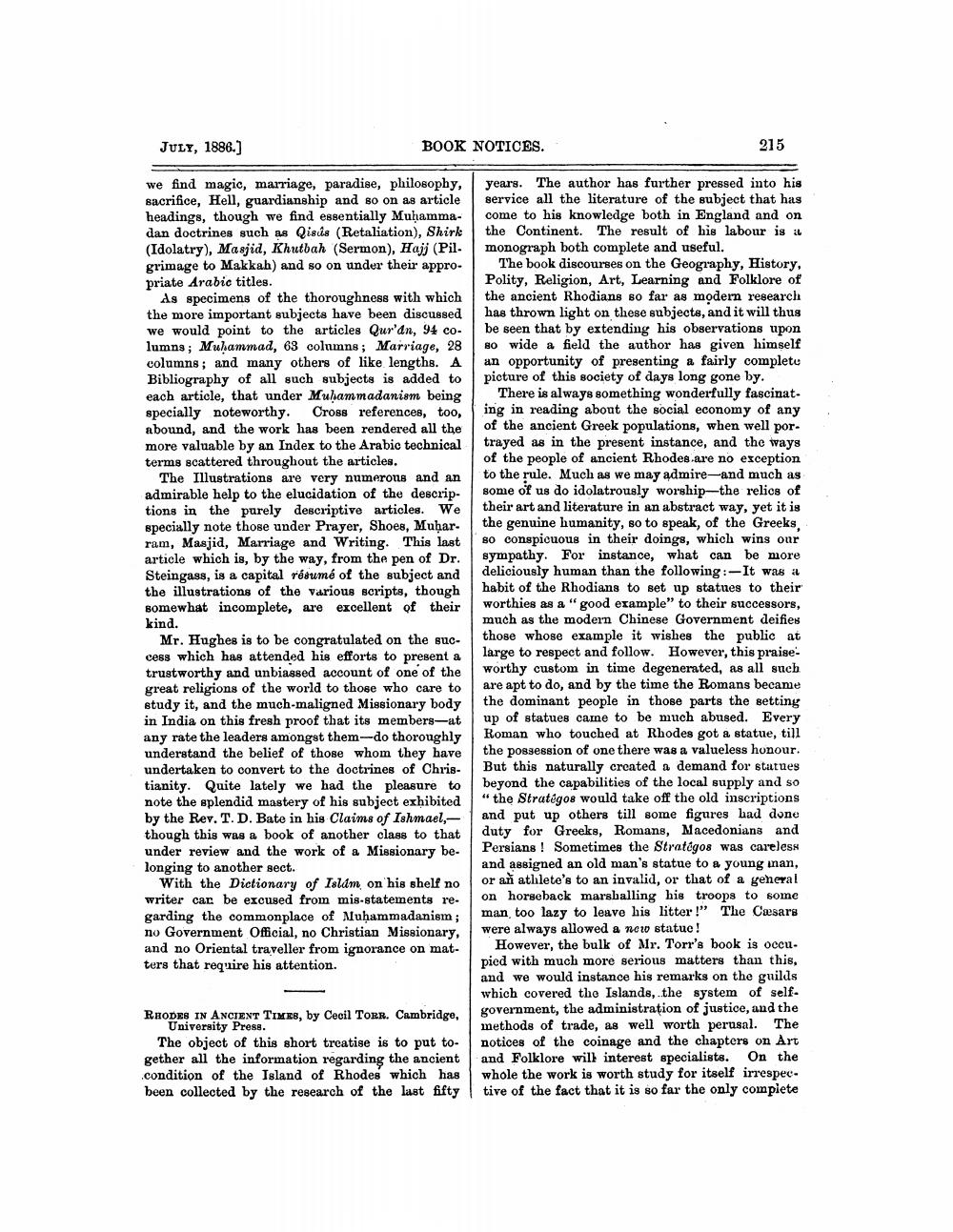________________
JULY, 1886.]
we find magic, marriage, paradise, philosophy, sacrifice, Hell, guardianship and so on as article headings, though we find essentially Muḥammadan doctrines such as Qisús (Retaliation), Shirk (Idolatry), Masjid, Khutbah (Sermon), Hajj (Pilgrimage to Makkah) and so on under their appropriate Arabic titles.
BOOK NOTICES.
As specimens of the thoroughness with which the more important subjects have been discussed we would point to the articles Qur'an, 94 columns; Muḥammad, 63 columns; Marriage, 28 columns; and many others of like lengths. A Bibliography of all such subjects is added to each article, that under Muḥammadanism being specially noteworthy. Cross references, too, abound, and the work has been rendered all the more valuable by an Index to the Arabic technical terms scattered throughout the articles.
The Illustrations are very numerous and an admirable help to the elucidation of the descriptions in the purely descriptive articles. We specially note those under Prayer, Shoes, Muḥarram, Masjid, Marriage and Writing. This last article which is, by the way, from the pen of Dr. Steingass, is a capital résumé of the subject and the illustrations of the various scripts, though somewhat incomplete, are excellent of their
kind.
Mr. Hughes is to be congratulated on the success which has attended his efforts to present a trustworthy and unbiassed account of one of the great religions of the world to those who care to study it, and the much-maligned Missionary body in India on this fresh proof that its members-at any rate the leaders amongst them-do thoroughly understand the belief of those whom they have undertaken to convert to the doctrines of Christianity. Quite lately we had the pleasure to note the splendid mastery of his subject exhibited by the Rev. T. D. Bate in his Claims of Ishmael,though this was a book of another class to that under review and the work of a Missionary belonging to another sect.
With the Dictionary of Islám on his shelf no writer can be excused from mis-statements regarding the commonplace of Muḥammadanism; no Government Official, no Christian Missionary, and no Oriental traveller from ignorance on matters that require his attention.
RHODES IN ANCIENT TIMES, by Cecil TORR. Cambridge, University Press.
The object of this short treatise is to put together all the information regarding the ancient condition of the Island of Rhodes which has been collected by the research of the last fifty
215
years. The author has further pressed into his service all the literature of the subject that has come to his knowledge both in England and on the Continent. The result of his labour is a monograph both complete and useful.
The book discourses on the Geography, History, Polity, Religion, Art, Learning and Folklore of the ancient Rhodians so far as modern research has thrown light on these subjects, and it will thus be seen that by extending his observations upon so wide a field the author has given himself an opportunity of presenting a fairly complete picture of this society of days long gone by.
There is always something wonderfully fascinating in reading about the social economy of any of the ancient Greek populations, when well portrayed as in the present instance, and the ways of the people of ancient Rhodes are no exception to the rule. Much as we may admire-and much as some of us do idolatrously worship-the relics of their art and literature in an abstract way, yet it is the genuine humanity, so to speak, of the Greeks, so conspicuous in their doings, which wins our sympathy. For instance, what can be more deliciously human than the following:-It was a habit of the Rhodians to set up statues to their worthies as a "good example" to their successors, much as the modern Chinese Government deifies those whose example it wishes the public at large to respect and follow. However, this praiseworthy custom in time degenerated, as all such are apt to do, and by the time the Romans became the dominant people in those parts the setting up of statues came to be much abused. Every Roman who touched at Rhodes got a statue, till the possession of one there was a valueless honour. But this naturally created a demand for statues beyond the capabilities of the local supply and so "the Strategos would take off the old inscriptions and put up others till some figures had done duty for Greeks, Romans, Macedonians and Persians! Sometimes the Strategos was careless and assigned an old man's statue to a young man, or an athlete's to an invalid, or that of a general on horseback marshalling his troops to some man, too lazy to leave his litter!" The Cæsars were always allowed a new statue!
However, the bulk of Mr. Torr's book is occupied with much more serious matters than this, and we would instance his remarks on the guilds which covered the Islands, the system of selfgovernment, the administration of justice, and the methods of trade, as well worth perusal. The notices of the coinage and the chapters on Art and Folklore will interest specialists. On the whole the work is worth study for itself irrespective of the fact that it is so far the only complete




